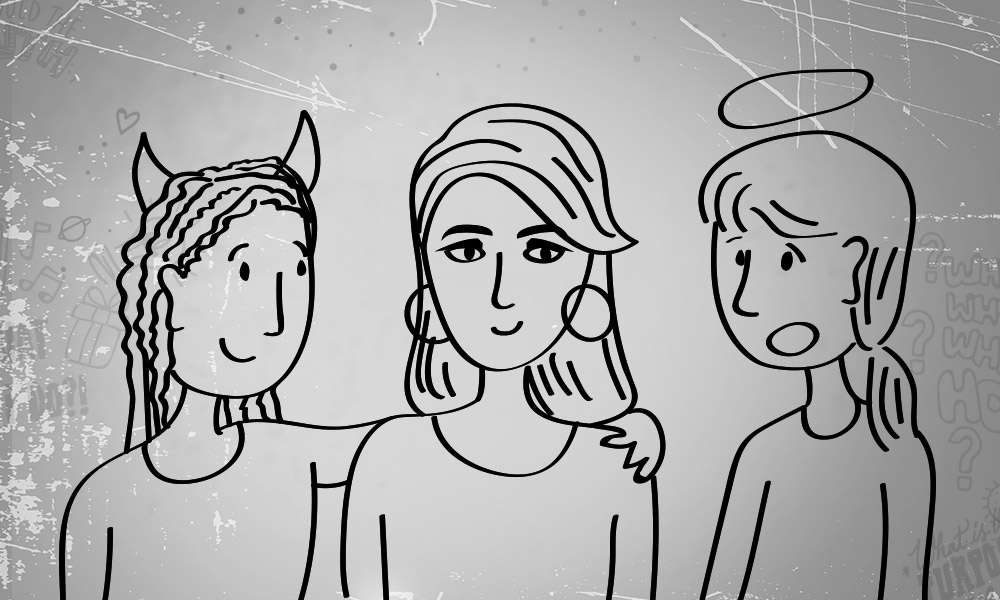Friendships often emerge for distinct purposes or periods, embodying the transient essence of human bonds. Recognizing this, we navigate the ebb and flow of relationships, embracing the lessons and support they offer, while also discerning one-sided dynamics and setting boundaries when necessary. Through solitude, we find empowerment and self-discovery, strengthening our intuition to cultivate meaningful connections. As we journey through the evolving landscape of friendships, we embrace change, learning and growing from each encounter, finding beauty in the purposeful flow of connections for a reason or season.
Navigating Transient Friendships: Understanding “Friends for a Reason or Season”
I. Introduction
A. Definition of “Friends for a Reason or Season” “Friends for a reason or season” encapsulates the idea that not all friendships are meant to last a lifetime. Some individuals come into our lives for specific reasons or periods, offering lessons, support, or companionship for a temporary duration. This concept acknowledges the transient nature of human connections and emphasizes the importance of recognizing the purpose and seasonality of friendships.
It’s unfortunately true that some individuals may enter our lives solely to take advantage of our kindness, generosity, or resources. These users may appear friendly and supportive at first, but their intentions become apparent when they only reach out when they need something from us and disappear once their needs are met. Encountering such individuals can be disheartening and can leave us feeling used or taken advantage of.
However, it’s essential to recognize these patterns early on and set boundaries to protect ourselves from being exploited. Here are some strategies for dealing with people who use our goodness and then walk away:
Trust Your Instincts: If something feels off or if you notice a pattern of someone only reaching out when they need something, trust your instincts. Pay attention to how you feel in their presence and whether the relationship feels balanced and reciprocal.
Set Boundaries: Establish clear boundaries around what you’re willing and able to offer in a relationship. Communicate your needs and expectations openly and assertively, and don’t hesitate to say no if someone consistently crosses your boundaries or takes advantage of your kindness.
Evaluate the Relationship: Take a step back and evaluate the relationship objectively. Consider whether the other person contributes positively to your life and whether the friendship is mutually beneficial. If the relationship is consistently one-sided, it may be time to reevaluate its significance in your life.
Limit Contact: If necessary, limit your contact with individuals who only seem to be interested in using your goodness for their benefit. Focus your time and energy on relationships that are supportive, reciprocal, and enriching.
Practice Self-Care: Prioritize self-care and self-love to replenish your emotional reserves and protect your well-being. Surround yourself with supportive friends and loved ones who appreciate you for who you are and uplift you in times of need.
Remember that it’s okay to prioritize your own well-being and to distance yourself from people who don’t respect your boundaries or appreciate your kindness. By trusting your instincts, setting boundaries, and focusing on relationships that nurture and support you, you can cultivate healthier, more fulfilling connections in your life.
B. Significance of Understanding the Transient Nature of Friendships Understanding the transient nature of friendships is essential for navigating the complexities of human relationships. It allows us to appreciate the valuable lessons and support offered by temporary connections while also acknowledging when it’s time to let go or reevaluate the dynamics of a friendship. Recognizing that not all relationships are meant to last forever helps us cultivate healthier, more fulfilling connections based on mutual respect and reciprocity.
C. Who and How Should One Use This Article This article is for anyone who seeks to navigate the ups and downs of friendships with greater understanding and insight. Whether you’re grappling with the loss of a friendship, struggling to identify one-sided dynamics, or simply seeking guidance on how to cultivate meaningful connections, this article offers practical tips, tricks, and anecdotes to help you along your journey. By embracing the concept of “friends for a reason or season,” readers can learn to navigate the transient nature of friendships with grace, wisdom, and resilience.

II. The Nature of Transient Friendships
A. Reason: Lessons and Growth Transient friendships often serve a specific purpose in our lives, offering valuable lessons and opportunities for personal growth. These friendships may emerge during pivotal moments or challenges, providing us with the support, guidance, or perspective needed to navigate difficult circumstances. For example, a colleague who becomes a close confidant during a challenging project may offer insights and encouragement that propel us forward in our career. Recognizing the lessons inherent in these friendships allows us to embrace the growth opportunities they present and appreciate the impact they have on our journey.
B. Season: Support and Change Seasonal friendships, on the other hand, provide support and companionship during periods of transition or change. These friendships may emerge during significant life events such as moving to a new city, starting a new job, or experiencing a personal loss. While the intensity of these connections may fluctuate over time, they play a crucial role in providing comfort, empathy, and solidarity during times of upheaval. For instance, a neighbor who offers a listening ear and a shoulder to lean on during a challenging relocation process may provide the support needed to navigate the transition with greater ease. Understanding the seasonal nature of these friendships allows us to cherish the support they offer while remaining open to the evolution of the relationship.
C. Recognizing the Signs of Seasonal Friendships Recognizing the signs of seasonal friendships is essential for navigating the transient nature of these connections effectively. Some common indicators of seasonal friendships include a shared experience or circumstance that initially brings individuals together, such as attending the same university or working for the same company. Additionally, seasonal friendships may exhibit a temporary intensity or closeness that fades over time as circumstances change. For example, a friendship formed through a shared hobby or interest may wane as one person’s priorities shift or diverge. By acknowledging these signs and remaining mindful of the seasonal nature of friendships, we can appreciate the support and companionship they offer while also maintaining realistic expectations about the longevity of the relationship.

III. Navigating One-Sided Relationships
A. Identifying Users and Takers One of the challenges of navigating friendships is recognizing when a relationship becomes one-sided, with one party consistently taking more than they give. Signs of a one-sided friendship may include always being the one to initiate contact or make plans, feeling drained or unappreciated after spending time with the other person, or noticing a lack of reciprocity in emotional support or effort. Identifying users and takers in our social circles is crucial for preserving our emotional well-being and maintaining healthy boundaries.
B. Setting Boundaries to Protect Yourself Setting boundaries is essential for protecting ourselves in one-sided relationships and preserving our emotional energy. This may involve communicating our needs and expectations clearly, asserting ourselves when our boundaries are crossed, or limiting our interactions with individuals who consistently take advantage of our kindness or generosity. For example, if a friend frequently monopolizes our time and attention without considering our own needs, we might establish boundaries around how often we’re available to meet or communicate.
C. Knowing When to Let Go Knowing when to let go of a one-sided relationship is often the most challenging part of navigating these dynamics. While it can be difficult to end a friendship, especially if we’ve invested time and effort into nurturing the connection, continuing to invest in a relationship that drains us emotionally or leaves us feeling unfulfilled ultimately does more harm than good. Trusting our instincts and recognizing when a friendship no longer serves our best interests allows us to let go with grace and compassion, freeing ourselves to cultivate healthier, more balanced relationships. It’s okay to prioritize our own well-being and surround ourselves with people who uplift and support us in return.

IV. The Power of Solitude in Friendship
A. Embracing “Alone Power” for Self-Reflection Solitude offers a valuable opportunity for self-reflection and introspection, allowing us to deepen our understanding of ourselves and our relationships. Embracing “alone power” involves setting aside dedicated time for solitude, whether through solitary activities like journaling, meditation, or spending time in nature. By stepping away from the noise and distractions of everyday life, we create space to reflect on our thoughts, feelings, and experiences, gaining clarity and insight into our own needs, desires, and boundaries. This self-awareness not only enriches our personal growth but also enhances our ability to navigate friendships with greater authenticity and intention.
B. Building Self-Reliance in Relationships Self-reliance is a cornerstone of healthy relationships, allowing us to maintain our independence and autonomy while still fostering meaningful connections with others. Embracing solitude helps cultivate self-reliance by fostering a sense of inner strength and resilience. When we’re comfortable being alone, we’re less likely to rely on others for validation or fulfillment, freeing us to engage in relationships from a place of abundance rather than neediness. This self-assurance not only strengthens our existing friendships but also attracts new connections based on mutual respect and equality.
C. Finding Fulfillment in Independence Independence is essential for cultivating a sense of fulfillment and satisfaction in life, regardless of our relationship status. Embracing solitude allows us to explore our interests, pursue our passions, and prioritize self-care without feeling guilty or obligated to others. Whether it’s traveling solo, pursuing a hobby, or simply enjoying our own company, finding fulfillment in independence enriches our lives and enhances our capacity to give and receive love in friendships. By embracing the power of solitude, we learn to appreciate our own company and find contentment in the present moment, enriching our relationships with authenticity, presence, and joy.

V. Applying Discernment in Friendships
A. Cultivating Quality Over Quantity In a world filled with social media and superficial connections, it’s easy to prioritize quantity over quality when it comes to friendships. However, true fulfillment comes from cultivating deep, meaningful connections with a select few individuals who genuinely enrich our lives. Cultivating quality over quantity in friendships involves investing time and energy into relationships that align with our values, interests, and goals. It means prioritizing authenticity, trust, and mutual respect over superficiality or convenience. By focusing on nurturing a few genuine connections, we create space for deeper intimacy, support, and companionship in our lives.
B. Valuing Genuine Connections Genuine connections are built on a foundation of trust, honesty, and vulnerability. These are the friendships where we can be our true selves without fear of judgment or rejection, where we feel seen, heard, and accepted for who we are. Valuing genuine connections means being willing to invest in relationships that nourish our soul and bring out the best in us. It involves showing up authentically, listening with empathy, and being present for our friends in both good times and bad. By prioritizing genuine connections, we create a support network of individuals who uplift, inspire, and empower us to be our most authentic selves.
C. Trusting Your Intuition Our intuition serves as a powerful guide in navigating friendships, helping us discern between genuine connections and superficial ones. Trusting your intuition means paying attention to how you feel in the presence of others, noticing any red flags or gut instincts that signal something may be off in a relationship. It involves honoring your own needs and boundaries, even if it means stepping away from friendships that no longer serve you. While it’s important to give others the benefit of the doubt, trusting your intuition allows you to protect your emotional well-being and cultivate relationships that align with your values and aspirations. By listening to your inner wisdom, you can navigate friendships with confidence, clarity, and authenticity.
VI. Embracing Growth and Change
A. Learning from Each Friendship Encounter Every friendship encounter, whether fleeting or enduring, presents an opportunity for growth and learning. By approaching each interaction with curiosity and an open mind, we can glean valuable insights about ourselves, others, and the dynamics of human relationships. Even friendships that end or fade away teach us valuable lessons about boundaries, communication, and self-worth. Embracing the opportunity to learn from each friendship encounter allows us to evolve and become more resilient, empathetic, and discerning in our relationships.
B. Embracing the Journey of Personal Development Friendships play a significant role in our personal development journey, shaping our beliefs, values, and behaviors in profound ways. Embracing the journey of personal development means being willing to grow and evolve alongside our friendships, adapting to change and embracing new experiences with an open heart. It involves stepping outside of our comfort zone, challenging ourselves to expand our perspectives, and welcoming the lessons that come with each new connection. By embracing the journey of personal development, we empower ourselves to become the best versions of ourselves while fostering deeper, more meaningful relationships with others.
C. Finding Empowerment in Letting Go Letting go of friendships that no longer serve us can be one of the most empowering acts of self-care and self-love. Whether due to changing circumstances, diverging paths, or toxic dynamics, releasing attachments to friendships that no longer align with our values or support our growth is essential for our emotional well-being. Finding empowerment in letting go means honoring our own needs and boundaries, even if it means walking away from familiar or comfortable relationships. It involves trusting that by releasing what no longer serves us, we create space for new opportunities, connections, and growth to unfold. By letting go with grace and compassion, we free ourselves to embrace new chapters of our lives with courage, resilience, and authenticity.
VII. Conclusion
A. Embracing the Seasonality of Friendships In conclusion, embracing the seasonality of friendships allows us to navigate the transient nature of human connections with grace and understanding. Just as the seasons change, so too do our friendships, each serving a unique purpose or offering support during a specific period of our lives. By recognizing and appreciating the ebb and flow of relationships, we can cherish the lessons, support, and companionship they offer while remaining open to the evolution of our connections.
B. Finding Strength in “Alone Power” “Alone power” offers a source of strength and empowerment in navigating the complexities of friendships. Embracing solitude allows us to cultivate self-awareness, self-reliance, and self-fulfillment, enriching our relationships with authenticity, resilience, and depth. By finding strength in our own company and prioritizing our emotional well-being, we create a solid foundation for building healthy, fulfilling connections with others.
C. Navigating Life’s Friendships with Resilience and Wisdom As we journey through life’s friendships, we do so with resilience and wisdom, trusting in our intuition and inner guidance to navigate the ups and downs of human connections. By cultivating discernment, authenticity, and compassion in our relationships, we foster deeper connections based on mutual respect, understanding, and support. With resilience and wisdom as our companions, we embrace the ever-changing landscape of friendships with grace, gratitude, and a sense of adventure.
In essence, by embracing the seasonality of friendships, finding strength in “alone power,” and navigating life’s friendships with resilience and wisdom, we can cultivate meaningful connections that enrich our lives and deepen our understanding of ourselves and others. As we continue on our journey, may we cherish the beauty of transient connections, savor the moments of solitude, and embrace the transformative power of authentic relationships.
References
Books on Friendship and Relationships:
- “Friendship: The Evolution, Biology, and Extraordinary Power of Life’s Fundamental Bond” by Lydia Denworth
- “The Gifts of Imperfection: Let Go of Who You Think You’re Supposed to Be and Embrace Who You Are” by Brené Brown
- “The Four Agreements: A Practical Guide to Personal Freedom” by Don Miguel Ruiz
- “Attached: The New Science of Adult Attachment and How It Can Help You Find – and Keep – Love” by Amir Levine and Rachel Heller
Books on Personal Growth and Self-Reflection:
- “The Power of Now: A Guide to Spiritual Enlightenment” by Eckhart Tolle
- “Daring Greatly: How the Courage to Be Vulnerable Transforms the Way We Live, Love, Parent, and Lead” by Brené Brown
- “The Alchemist” by Paulo Coelho
- “The Untethered Soul: The Journey Beyond Yourself” by Michael A. Singer
Articles and Research Papers:
- “The Benefits of Solitude” by Psychology Today
- “The Power of Intuition: How to Use Your Gut Feelings to Make Better Decisions at Work” by Harvard Business Review
- “The Importance of Setting Boundaries in Friendships” by Verywell Mind
- “The Transience of Friendship” by The Atlantic







:max_bytes(150000):strip_icc()/iStock-496546048-5891f14a5f9b5874ee82a5fc.jpg?w=150&resize=150,150&ssl=1)
